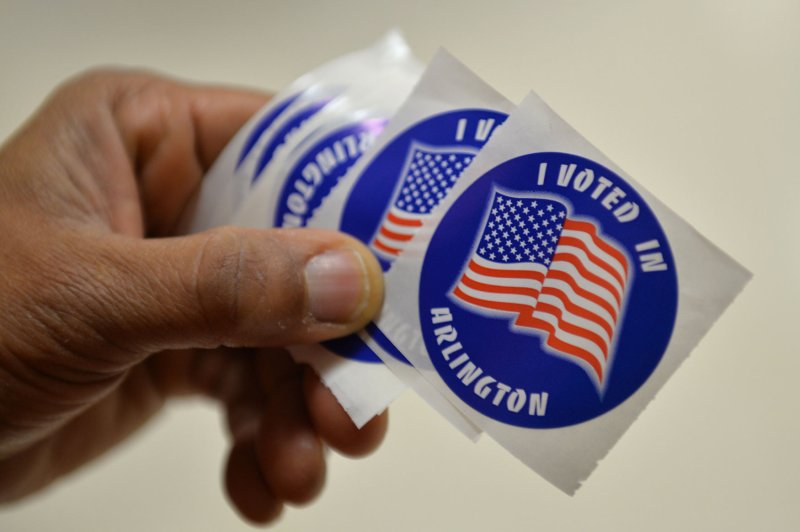A volunteer holds stickers at a voting location for the presidential primary on Super Tuesday, in Arlington, Va., on March 1. Friday, the Virginia Supreme Court struck down an executive order by Gov. Terry McAuliffe in April that restored full voting rights to tens of thousands of convicted felons who have completed their prison sentences and are no longer on prole. The court ruled that the governor overstepped his authority in giving the order. File Photo by Kevin Dietsch/UPI |
License Photo
RICHMOND, Va., July 22 (UPI) -- The Virginia Supreme Court was split Friday in dismissing an order by Gov. Terry McAuliffe earlier this year to restore full voting rights to more than 200,000 convicted felons.
The Fourteenth Amendment of the U.S. Constitution permits each state to determine its own laws regarding felons' voting rights. In April, McAuliffe ordered that such offenders who are no longer in prison or on probation or parole be allowed the right to cast ballots.
Republicans, though, argued that was too general an order -- and said voting power should instead be given to ex-cons on a case-by-case basis.
Friday, the state's high court agreed by a vote of 4-3 -- saying the governor overstepped his authority.
"Never before have any of the prior 71 Virginia Governors issued a clemency order of any kind -- including pardons, reprieves, commutations, and restoration orders -- to a class of unnamed felons without regard for the nature of the crimes or any other individual circumstances relevant to the request," Chief Justice Donald W. Lemons wrote for the majority. "To be sure, no Governor of this Commonwealth, until now, has even suggested that such a power exists.
"All agree that the Governor can use his clemency powers to mitigate a general rule of law on a case-by-case basis. But that truism does not mean he can effectively rewrite the general rule of law and replace it with a categorical exception."
It's unclear exactly how McAuliffe will respond to the court's ruling, if he does at all. Previously, officials have said the governor was willing to grant voting rights to all qualified felons one at-a-time if his order was defeated on appeal.
McAuliffe's order also would have allowed certain felons to run for political office, perform jury duty and become a notary public. More than 11,000 qualifying felons have registered to vote since the executive order was signed, but officials estimate that more than 200,000 would have been able to under the governor's action.
"The general rule of law is clear: 'No person who has been convicted of a felony shall be qualified to vote,'" the court added. "Under [McAuliffe's] order, no person who has been convicted of a felony shall be disqualified to vote unless the felon is incarcerated or serving a sentence of supervised release. This rule-exception inversion may appear subtle to some, but it undermines the very basis for the legitimate use of the executive restoration power."
The court's dismissal means the state's Department of Elections must now cancel all the registrations made by qualifying convicted felons since April.
McAuliffe did not immediately respond Friday to the court's decision.















